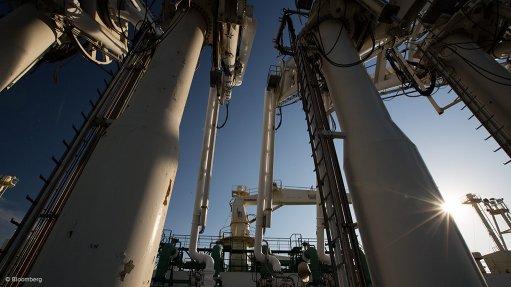
Photo by: Bloomberg
PERTH (miningweekly.com) – Advisory firm PwC on Monday reported that Australia’s oil and gas industry was lagging its global counterparts in critical capabilities, but noted that a renewed focus on upstream activity, including the adoption of lean manufacturing principles, would complement efforts to boost productivity, cut costs and close the gap with overseas peers.
Speaking to delegates at the first day of the Australian Petroleum Production and Exploration Association (Appea) conference, PwC Australia’s head of energy, utilities and mining, Jock O’Callaghan said that the renewed focus on upstream activity could lead to a 10% to 20% improvement on breakeven costs.
In its new report, titled 'Best in Class: How Upstream Gas Can Work Smarter', PwC reported that half of the liquefied natural gas (LNG) operators in Australia that reported significant capital blowouts in their projects, cited upstream issues as one contributing cause to the overruns.
“Left unchecked, high production costs could threaten export markets for new LNG capacity,” O’Callaghan said.
“Once our liquefaction plants are built, we still need to maintain a low-cost feedstock position to ensure long run viability of our gas industry. Unfortunately, Australia does not have a great track record in delivering productivity improvement.”
O’Callaghan noted that based on overseas markets, closing the gap to achieve best practice could affect a number of areas, including a near 40% improvement in delivery cycle times, a 3% decrease in development capital and well development costs, a more than 15% reduction in operating and maintenance costs and up to a 10% reduction in total procurement costs.
He told delegates on Monday that closing the gap would require a concerted effort by both industry and government, with O’Callaghan saying that industry should cultivate a continuous improvement culture to catch up with and ultimately become the standard setter for global ‘best in class’.
Furthermore, PwC advised that the industry should adopt a “factory” approach to operations and unconventional field development, with the report showing that optimising operations around total cost of operations and not production, had a significant positive impact on breakeven costs.
Furthermore, industry was advised to make explicit investments in innovation, and not just adopt overseas technology.
“In Australia, a blanket increase to innovation funding from the government is not the answer. What is needed is a focus on creating an environment that encourages the development of truly groundbreaking innovation that increases our competitive advantage,” O’Callaghan said.
He also noted that government should do its part to ensure that the gap is met, by encouraging collaborative innovation, adopting a more customer-focused view on how it engaged with the industry, and putting in place explicit legislation and regulation for unconventional operations, while also further enabling foreign capital to lower development risks for domestic players.